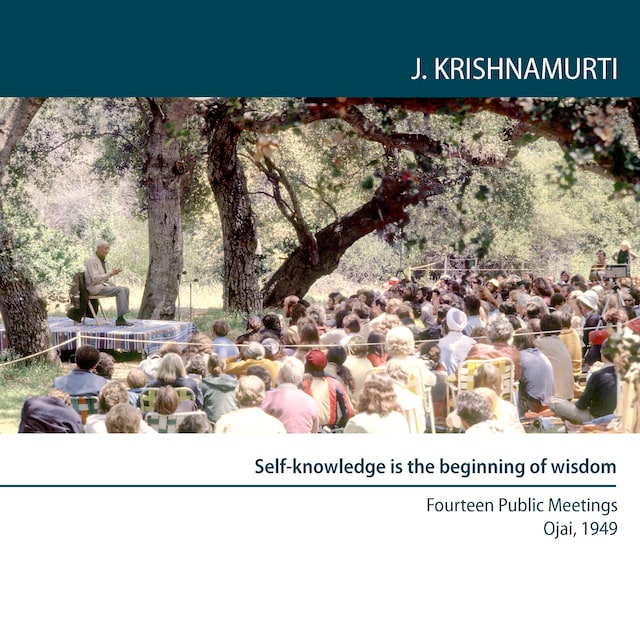
Self-knowledge is the beginning of wisdom
Fourteen Public Meetings, Ojai, USA, 1949
Description of book
Seven Public Talks 1. Does self-knowledge come through searching? - 16 July 1949 Duration: 59 minutes • What is it that most of us are seeking? • Does clarity come through searching and trying to find out what others say? • Can incessant search and longing give you the extraordinary sense of reality or creative being that comes when you really understand yourself? • Without knowing your background and the substance of your thought, where it comes from, surely your search is utterly futile and your action has no meaning. • The responsibility for any action depends on ourselves, not on others. • Q: Do I have to be at any special level of consciousness to understand you? • Q: The movement of life is experienced in relationship to people and to ideas. 2. Relationship has significance only when it is a process of self-revelation - 17 July 1949 Duration: 37 minutes • Where there is authority there can be no discovery of something new. • Relationship based on an idea cannot be a self-revealing process. • Self-knowledge is understood, uncovered and its process revealed through relationship. • Is it possible to love without the interference of the mind? • When the mind becomes supreme, all-important, then there can be no affection. • Q: What is that thinking that must come to an end? What do you mean by thinking and thought? 3. If we had no belief what would happen to us? - 23 July 1949 Duration: 39 minutes • Without self-knowledge we cannot go beyond the self-projected illusions of the mind. • It's only in relationship that one can know oneself as one is. • A mind that is filled with beliefs, dogmas, assertions and quotations is an un creative, repetitive mind. • Can we look at ourselves without beliefs? • A mind that is quiet because it understands fear and understands itself is creative. • Q: Our mind knows only the known. What is it in us that drives us to find the unknown, reality, or God? 4. Simplicity cannot be found unless one is free inwardly - 24 July 1949 Duration: 57 minutes • Only when the mind and heart are really simple is one able to solve the many problems that confront us. • A religious man is he who is inwardly simple. • Q: I have been a member of various religious organizations but you have destroyed them all. I am utterly bored and work because hunger forces me to it. I am afraid to commit suicide. What on earth am I to do? • Q: What have you to say to a person who, in quiet moments, sees the truth of what you say, who has a longing to keep awake but who finds himself repeatedly lost in a sea of impulse and small desires? 5. How is one to be aware? - 30 July 1949 Duration: 64 minutes • Does the understanding of ourselves demand a specialization? • What is it that we need capacity for? • How is one to be capable of meeting life as a whole? • How are we aware of something? • To understand relationship there must be an awareness which is not aggressively positive. • Q: All religions have insisted on some kind of self-discipline to moderate the instincts of the brute in man. You seem to imply that such disciplines are a hindrance to the realization of God. Who is right in this matter? 6. What is true religion? - 31 July 1949 Duration: 47 minutes • Is religion a matter of sensation? • Religion is not ceremony, dogma nor the continuation of tenets or beliefs inculcated from childhood. • Belief in God does not make you a religious person. • Self-knowledge is the beginning of wisdom. • Q: Will you please carefully explain what is true meditation? 7. To understand 'what is' there must be no prejudice - 6 August 1949 Duration: 40 minutes • To understand reality, or for that immensity to come into being, one must understand the process of one's own thinking. • How is it possible to go into the deeper layers of consciousness? • If we do not name then perhaps it's possible to go into the deeper layers of consciousness.


